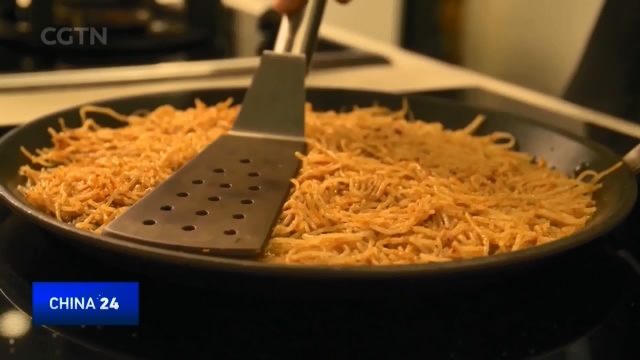
21:08, 04-Jan-2018
Singapore Cuisine: Supper clubs keep Peranakan culture alive

Peranakan cooking in Singapore emphasizes traditional methods and guards family recipes closely, but a Peranakan revival in the past few years has led to some home cooks opening up their kitchens to friends and strangers. Our correspondent Miro Lu has the story.
Most Singaporeans know of Lynnette Seah as an acclaimed violinist and a recipient of the Cultural Medallion, Singapore's most prestigious arts award. But her friends know that she is also an amazing cook for Peranakan cuisine.
Peranakan food originated from the early Chinese migrants who married Malays from Singapore, Malaysia and Indonesia. The woman, or nyonyas, mixed Chinese ingredients with Malay spices such as galangal and tamarind, resulting in tangy and spicy flavors that make Peranakan food so popular in this part of the world.
LYNNETTE SEAH FOUNDER, LYNNETTE'S KITCHEN "I think Peranakan cuisine is the most complex and most interesting flavor of any cuisine in my opinion. Because in each dish there are at least 12 to 15 different ingredients that go into the rempah, which is the spice mix. It's the base of building up the flavor of each dish.
Lynnette has started her home-based private dining service in 2015. Like a true Peranakan matriarch, she enjoys feeding people and providing a special dining experience.
LYNNETTE SEAH FOUNDER, LYNNETTE'S KITCHEN "What I'm trying to do is to keep the culture alive and the cuisine alive by doing the home cooking style, which in my opinion is the way the Peranakan culture is built upon. In those days, the ladies in the kitchen will be pounding chillies and galangal all day long. It's communal, it's family getting together at the end of the day. So I always serve at least seven to eight dishes for each dinner."
This crispy mee siam with prawn sambal and quail eggs is a re-creation of the classic rice noodle dish usually comes with gravy. Annette Tan, a food writer who owns home restaurant Fatfuku, wishes to preserve Peranakan cuisine by allowing it to evolve.
MIRO LU SINGAPORE "Some home cooks serve Peranakan recipes made the traditional way. But for others, putting a modern spin on Peranakan cooking keeps it fresh and relevant to young diners."
JASON LIM GUEST "What I just experienced tonight is significantly differently, it's like a huge difference from any other Peranakan restaurant I've sat in and tried. I think that there is a difference when food no matter what culture becomes commercialized compare to when you keep it in a home setting, the way you cook for friends and for family, the way you eat, and the taste are radically different."
Traditional or not, what matters most is taste and experience. Judging from the satisfying looks on diners' faces and a long waiting list for a table at these popular supper clubs, Peranakan home cooking is here to stay. Miro Lu, CGTN, Singapore.

SITEMAP
Copyright © 2018 CGTN. Beijing ICP prepared NO.16065310-3
Copyright © 2018 CGTN. Beijing ICP prepared NO.16065310-3